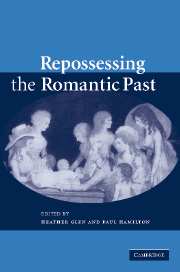Book contents
- Frontmatter
- Contents
- Notes on contributors
- Introduction
- PART I DISSENT AND OPPOSITION
- PART II REOPENING THE CASE OF EDGEWORTH
- 6 Edgeworth and Scott: the literature of reterritorialization
- 7 Maria Edgeworth and ‘the light of nature’: artifice, autonomy, and anti-sectarianism in Practical Education (1798)
- PART III DIFFERENT DIRECTIONS
- Marilyn Butler: a bibliography
- Index
6 - Edgeworth and Scott: the literature of reterritorialization
Published online by Cambridge University Press: 15 December 2009
- Frontmatter
- Contents
- Notes on contributors
- Introduction
- PART I DISSENT AND OPPOSITION
- PART II REOPENING THE CASE OF EDGEWORTH
- 6 Edgeworth and Scott: the literature of reterritorialization
- 7 Maria Edgeworth and ‘the light of nature’: artifice, autonomy, and anti-sectarianism in Practical Education (1798)
- PART III DIFFERENT DIRECTIONS
- Marilyn Butler: a bibliography
- Index
Summary
Few scholars have done as much as Marilyn Butler has to re-energize and reorient studies in the novel of the Romantic period. Even if she had never written, say, Jane Austen and the War of Ideas or Rebels, Romantics and Reactionaries, her work on Maria Edgeworth would constitute an enormously influential legacy in itself. It is work that stretches over four decades from Butler's early biography of the Anglo-Irish novelist into the invaluably annotated Pickering and Chatto edition, and beyond. Her insistence on taking Edgeworth seriously has not only made it possible to recover a neglected body of extraordinary writing. It has also had great impact on sub-fields for which Edgeworth was historically central: studies in post-Union Irish literature, for example, or in the relation between nineteenth-century literature and education, or in feminist accounts of Romantic literary history, or indeed in the Romantic novel more broadly, a field that has probably never been more keenly engaged than it is now. More particularly, understanding Edgeworth better, having a better sense of her place in literary history, makes a distinct difference for studies in Jane Austen and Sir Walter Scott, two of the authors for whom Edgeworth, in very different ways, set the stage. Butler herself has done much to show what Edgeworth meant to Austen's transformation of the domestic novel. Here I will be more interested in Edgeworth's relation to Scott's work in transforming – some would say ‘inventing’ – the historical novel.
- Type
- Chapter
- Information
- Repossessing the Romantic Past , pp. 119 - 139Publisher: Cambridge University PressPrint publication year: 2006
- 1
- Cited by

